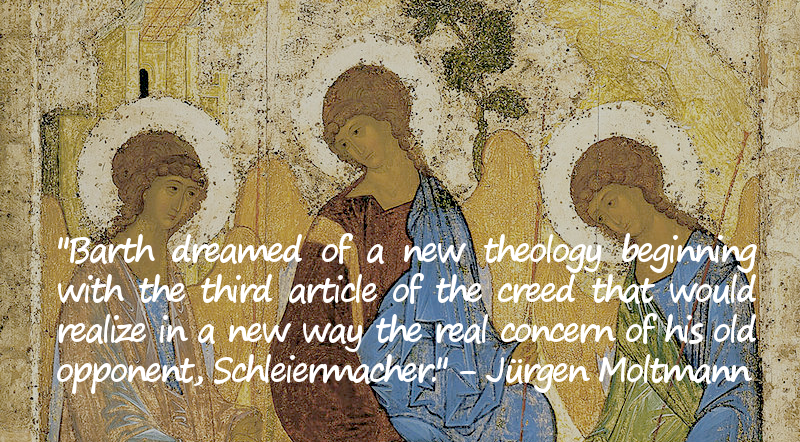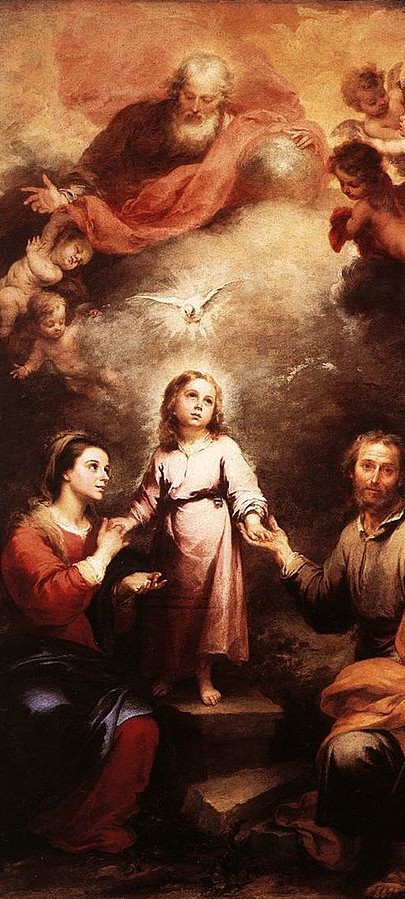 Who will be the next Karl Barth? This person may be out there among us now, or we may have to wait more than a millennium. Barth saw this person from afar, a man who would not merely repeat Barthianism, but would say something incredibly new! A New Creation in Theology! Barth thought that Jürgen Moltmann may have been this person? But ultimately, he said nein to Moltmann. However, it may very well be the nature of the next Doctor Angelicus to receive a nein from the incumbent.
Who will be the next Karl Barth? This person may be out there among us now, or we may have to wait more than a millennium. Barth saw this person from afar, a man who would not merely repeat Barthianism, but would say something incredibly new! A New Creation in Theology! Barth thought that Jürgen Moltmann may have been this person? But ultimately, he said nein to Moltmann. However, it may very well be the nature of the next Doctor Angelicus to receive a nein from the incumbent.
Even if Moltmann is not the next Karl Barth, he has stood on Barth's shoulders and had a look at the world around us in a way that only Karl Barth may have provided us. We are not looking for another Barthian, but a PostBarthian! Moltmann proves himself to be a PostBarthian, most clearly in his criticisms of Karl Barth's christocentricisms.

The Holy Spirit depicted as a dove descending on the Holy Family, with God the Father and angels shown atop, by Murillo, c. 1677. (source: wikipedia)
Moltmann has developed a Social Doctrine of the Trinity, following the Eastern Church in their rejection of the filioque, that emphasized the Holy Spirit in community with the Father and the Son. The Western Churches of Roman Catholicism and Protestantism have reduced the Holy Spirit in subordination of the filioque in the worst examples into an animal (e.g. a dove). Moltmann believes that Karl Barth has fallen into this 'forgetfulness of the Spirit' as well. The solution, Moltmann proposes, is the Social Trinity, where the three personas of the Godhead are in a community of love, and that the Holy Spirit is not merely a relationship between the Father and the Son.
Moltmann's Social Doctrine of the Trintiy first appeared in his book, Trinity and the Kingdom, and then was further developed in his book, God in Creation, and then received its fullest treatment, especially in regard to the experience of the Holy Spirit, in his later book, The Spirit of Life: A Universal Affirmation. At the opening of the Spirit of Life, there is a fascination quotation that poignantly shows that Schleiermacher, Barth's arch-nemesis, had ironically done what Barth desired, that being beginning his work in the Holy Spirit, and achieved, in a way, what Karl Barth longed that someone would! Moltmann says that Barth desired for a great theologian to begin his theology with the third article of the creed, 'I believe in the Holy Spirit...", when Friedrich Schleiermacher had done this very thing in his Christian Faith (Doctrine of Faith). The Christian Faith contains a famous introduction with an intersection of Knowing and Doing that yields the solution of Feeling, such that since we neither have Knowing or Feeling, then all we have is a 'feeling of absolute ddependence' and this is a foundation for Schleiermacher in the Third Article of the Creed (e.g Feeling as the experience of the Holy Spirit). But then again, maybe Karl Barth is right, because, if Schleiermacher understood his work as starting with this Third Article, then why did he place his doctrine of the Trinity in the appendix to his Christian Faith?
The following quotation is from Moltmann's The Spirit of Life: An Universal Affirmation discusses this question of who will be the next Church Father after Karl Barth, and who will provide us with a Holy Spirit Dogmatics! If it is not Moltmann, then Moltmann has sure move the ball down the field.
About twenty years ago it was usual to introduce studies on the Holy Spirit with a complaint about 'forgetfulness of the Spirit' at the present day generally, and in Protestant theology in particular. The Holy Spirit was said to be the Cinderella of Western theology. So it had to be specially cherished and coaxed into a growth of its own. This was undoubtedly a reaction against a particular kind of 'neo-orthodoxy' in the Protestant churches, as well as a counterweight to the christocentricism of Karl Barth's theology, and the theology of the 1934 Barmen Declaration of the Confessing Church. So one of Barth's own last words was always quoted: he dreamed, he said, of a new theology which would begin with the third article of the creed and would realize in a new way the real concern of his old opponent, Schleiermacher.
Moltmann, Jürgen. The Spirit of Life: A Universal Affirmation. Minneapolis: Fortress, 1992. 1. Print.



February 1st, 2015 - 10:59
Can I recommend, for a theology starting with the Holy Spirit, the first volume of what will be a 4 volume systematic theology by Sarah Coakley, ‘God, Sexuality, and the Self’. I recently finished rereading it, and it’s a stunning work (even if I disagree at points…)
February 14th, 2016 - 01:01
Honestly, I didn’t know what 50% of these questions even meant. So does that mean I’m not relaly a theologian at all? I tried to select a neutral stance on the things I didn’t understand, but I can’t promise I didn’t misunderstand something and screw the results on others.67% Friedrich Schleiermacher67% Calvin60% Tillich60% Luther 33% Augustine7% Jonathan EdwardsI don’t think Jonathan Edwards and I would get along.